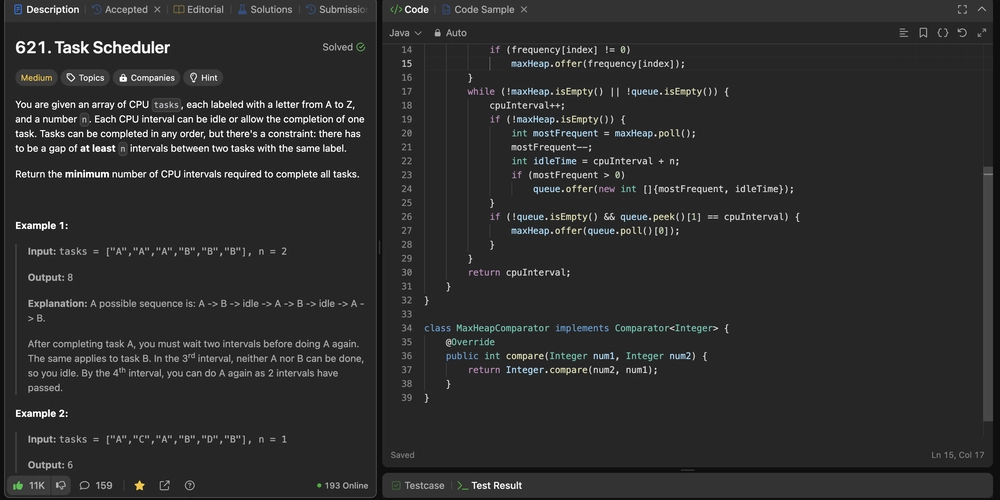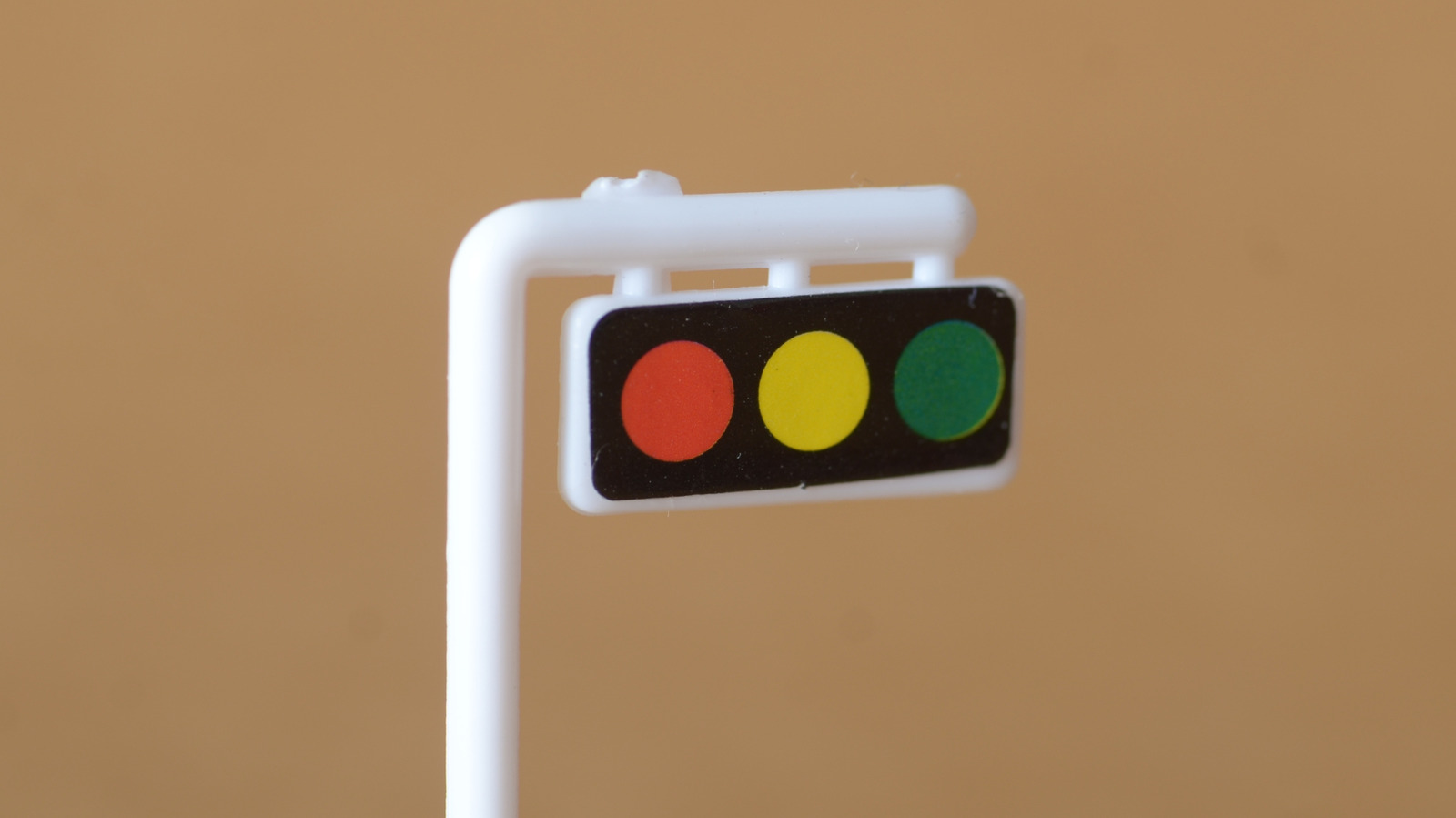Leetcode 621. Task Scheduler
Problem You are given an array of CPU tasks, each labeled with a letter from A to Z, and a number n. Each CPU interval can be idle or allow the completion of one task. Tasks can be completed in any order, but there's a constraint: there has to be a gap of at least n intervals between two tasks with the same label. Return the minimum number of CPU intervals required to complete all tasks. Sample Input Example 1: Input: tasks = ["A","A","A","B","B","B"], n = 2 Output: 8 Explanation: A possible sequence is: A -> B -> idle -> A -> B -> idle -> A -> B. After completing task A, you must wait two intervals before doing A again. The same applies to task B. In the 3rd interval, neither A nor B can be done, so you idle. By the 4th interval, you can do A again as 2 intervals have passed. Example 2: Input: tasks = ["A","C","A","B","D","B"], n = 1 Output: 6 Explanation: A possible sequence is: A -> B -> C -> D -> A -> B. With a cooling interval of 1, you can repeat a task after just one other task. Example 3: Input: tasks = ["A","A","A", "B","B","B"], n = 3 Output: 10 Explanation: A possible sequence is: A -> B -> idle -> idle -> A -> B -> idle -> idle -> A -> B. There are only two types of tasks, A and B, which need to be separated by 3 intervals. This leads to idling twice between repetitions of these tasks. Constraints 1

Problem
You are given an array of CPU tasks, each labeled with a letter from A to Z, and a number n. Each CPU interval can be idle or allow the completion of one task. Tasks can be completed in any order, but there's a constraint: there has to be a gap of at least n intervals between two tasks with the same label.
Return the minimum number of CPU intervals required to complete all tasks.
Sample Input
Example 1:
Input: tasks = ["A","A","A","B","B","B"], n = 2
Output: 8
Explanation: A possible sequence is: A -> B -> idle -> A -> B -> idle -> A -> B.
After completing task A, you must wait two intervals before doing A again. The same applies to task B. In the 3rd interval, neither A nor B can be done, so you idle. By the 4th interval, you can do A again as 2 intervals have passed.
Example 2:
Input: tasks = ["A","C","A","B","D","B"], n = 1
Output: 6
Explanation: A possible sequence is: A -> B -> C -> D -> A -> B.
With a cooling interval of 1, you can repeat a task after just one other task.
Example 3:
Input: tasks = ["A","A","A", "B","B","B"], n = 3
Output: 10
Explanation: A possible sequence is: A -> B -> idle -> idle -> A -> B -> idle -> idle -> A -> B.
There are only two types of tasks, A and B, which need to be separated by 3 intervals. This leads to idling twice between repetitions of these tasks.
Constraints
1 <= tasks.length <= 10^4
tasks[i] is an uppercase English letter.
0 <= n <= 100
Intuition
Suppose we start scheduling the less frequent task, then the idle time would be more for the more frequent tasks.
AAABBCC and idle time = 1 -> If we start from, say C, then one possible way could have been
CBCBA_A_A = 9 total CPU intervals, which is high.
Thus, we can try to have more frequent tasks to be done every time. To know the most frequent task after processing every task, a max heap can be used.
Approach
- Store the frequency of the characters in an array or map.
- Move all the frequencies that are non-zero to the max heap.
- Initialise a queue with new elements as [frequency, idleTime], which can be used to push back the task to the maxHeap once the idleTime of the particular task is over.
- Repeat the process until both the maxHeap and the queue are empty.
Complexity
-
Time complexity:
O(N) + O(26) + O(26log26)
-
Space complexity:
O(26)
Code
class Solution {
public int leastInterval(char[] tasks, int n) {
if (tasks == null || tasks.length == 0) {
return 0;
}
int [] frequency = new int [26];
for (char ch : tasks) {
frequency[ch - 'A']++;
}
PriorityQueue<Integer> maxHeap = new PriorityQueue<>(new MaxHeapComparator());
Queue<int[]> queue = new LinkedList<>();
int cpuInterval = 0;
for (int index = 0; index < 26; index++) {
if (frequency[index] != 0)
maxHeap.offer(frequency[index]);
}
while (!maxHeap.isEmpty() || !queue.isEmpty()) {
cpuInterval++;
if (!maxHeap.isEmpty()) {
int mostFrequent = maxHeap.poll();
mostFrequent--;
int idleTime = cpuInterval + n;
if (mostFrequent > 0)
queue.offer(new int []{mostFrequent, idleTime});
}
if (!queue.isEmpty() && queue.peek()[1] == cpuInterval) {
maxHeap.offer(queue.poll()[0]);
}
}
return cpuInterval;
}
}
class MaxHeapComparator implements Comparator<Integer> {
@Override
public int compare(Integer num1, Integer num2) {
return Integer.compare(num2, num1);
}
}













































































































































































![[The AI Show Episode 142]: ChatGPT’s New Image Generator, Studio Ghibli Craze and Backlash, Gemini 2.5, OpenAI Academy, 4o Updates, Vibe Marketing & xAI Acquires X](https://www.marketingaiinstitute.com/hubfs/ep%20142%20cover.png)






























































































































![[DEALS] Microsoft Office Professional 2021 for Windows: Lifetime License (75% off) & Other Deals Up To 98% Off – Offers End Soon!](https://www.javacodegeeks.com/wp-content/uploads/2012/12/jcg-logo.jpg)











































































































.jpg?#)





































.png?#)







































































































![YouTube Announces New Creation Tools for Shorts [Video]](https://www.iclarified.com/images/news/96923/96923/96923-640.jpg)

![Apple Faces New Tariffs but Has Options to Soften the Blow [Kuo]](https://www.iclarified.com/images/news/96921/96921/96921-640.jpg)







































































































































